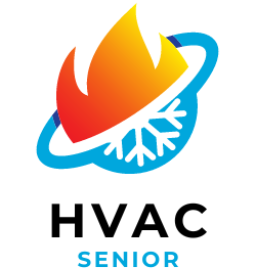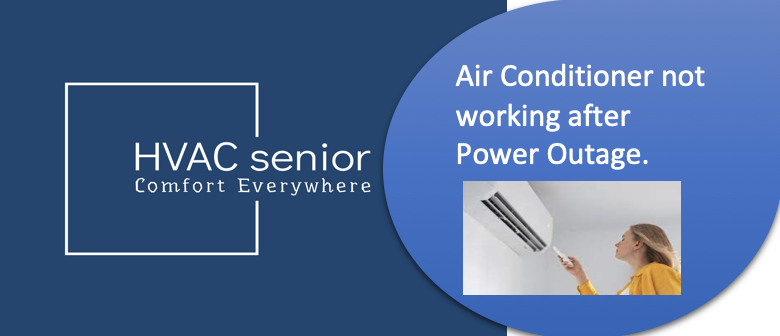Air Conditioner not working after Power Outage [Solved].
Stay composed and read on as we delve into the frequent issues that can arise when your Air Conditioner not working after Power Outage. Power interruptions are a common occurrence, and while they’re often just an inconvenience, they can occasionally lead to substantial damage to high-value appliances, such as your air conditioner.
Just at a glance: Air conditioner is not working after power outage can be due to Tripped breaker, failed capacitor,Blown Compressor,Programming Failure or Blower Motor Failure.
Now, let’s explore the typical reasons behind AC malfunctions following a power outage and discuss potential solutions. Before reaching out to an HVAC technician, try these troubleshooting steps to restore your air conditioner’s functionality.
Also read>>>Air Conditioner Squeaking.
Why Air Conditioner not working after Power Outage.
Once the power returns, you may notice your AC not working after a power outage. For instance, it may be running but not pushing out any air, or the air leaving the vents may be hot.
If this happens, the most likely cause can be any of the following things:
1.Tripped breaker.
One common culprit for an air conditioner malfunction following a power outage is a tripped breaker. Both the outdoor and indoor units of your HVAC system are powered by separate circuit breakers.
These breakers are designed to trip in the event of a power surge, safeguarding your unit’s internal components from potential electrical damage.
If you find your AC not working after a power outage, it may be due to a tripped breaker. An apparent but confusing situation can occur where your unit seems operational but fails to produce cool air. In such cases, it’s likely that the breaker for the outdoor unit has tripped while the one for the indoor unit remains unaffected.
Before taking any action, head to your electrical panel and inspect the breakers dedicated to your HVAC system.
Exercise caution, as mishandling this process can lead to damaging your air conditioner or the internal breaker, incurring significant costs.
To restart the system safely after a power outage, follow these steps:
- Turn off the system at the thermostat: Set the thermostat to the “Off” position to protect your AC from potential power surges when resetting the breaker.
- Power down the AC at the circuit breaker: Locate the breaker switches for both the outdoor and indoor units of your HVAC system and switch them to the “Off” position.
- Flip the breaker switches to the “On” position.
- Wait for 30 minutes: Allow sufficient time for the breakers and the system to release any accumulated electrical current. This step is crucial to prevent potential damage to the unit’s internal circuitry.
- Turn on the system at the thermostat: If the process was successful, your AC should engage and begin cooling your home, indicating that no significant damage has occurred.
2.Failed Capacitor.
After a power outage in Florida, an AC not working issue may stem from a failed capacitor. This vital component acts as the ignition switch for your air conditioning system, specifically initiating the compressor’s startup process. Unfortunately, capacitors are prone to failure, especially when exposed to power surges.
When a capacitor fails, the compressor fails to activate upon power restoration, leaving it unable to contribute to the heat exchange process. Consequently, your AC will be incapable of delivering cool air throughout your home.
Fix: Professional Inspection and Replacement.
While resolving a failed capacitor is a task best left to professionals, a preliminary visual inspection can provide valuable insights.
Begin by removing the panel covering the compressor within the outdoor unit. The capacitor, resembling a small canister, is typically positioned on top of the compressor. If you notice bulging or leaking, it signifies a blown capacitor.
To address this issue:
- Contact a Professional: Given the complexity of capacitor replacement and potential safety risks, it is advisable to enlist the services of a qualified HVAC technician.
- Professional Assessment: The technician will conduct a thorough inspection to confirm the capacitor’s failure and evaluate any additional damage.
- Capacitor Replacement: If deemed necessary, the technician will replace the failed capacitor with a new, functioning unit.
- System Testing: After replacement, the entire system will be tested to ensure proper functioning and to identify any other issues that may have arisen during the outage.
Also read>>>Air Conditioner Hissing.
3.Blown Compressor.
In the unfortunate event that your AC remains non-functional after a power outage in Florida, a potential and severe culprit could be a malfunctioning compressor. If an inspection of the capacitor reveals no issues, but your HVAC system fails to emit cool air, it’s indicative of a dead compressor.
Fix: Professional Assessment and Replacement Considerations
Addressing a blown compressor is a critical task that requires prompt attention. Follow these steps to navigate through this challenging situation:
–Contact a Technician Immediately
Given the significant complexity and cost associated with compressor issues, it’s crucial to reach out to a qualified HVAC technician as soon as possible.
–Professional Evaluation
The technician will conduct a thorough assessment to confirm the compressor’s malfunction and determine the extent of the damage.
–Consider Replacement Options
Depending on the severity of the compressor damage and the age of your unit, it may be more cost-effective to replace the entire AC unit rather than repairing the compressor alone. The technician can provide insights into the most economical and efficient course of action.
–Guidance for Informed Decision-Making
The technician will offer guidance on whether repairing the compressor or opting for a new unit is the more practical choice. Factors such as the age of the system, overall condition, and cost considerations will be taken into account.
–Cost-Effective Solutions
The technician can assist in exploring cost-effective options to ensure that you regain air conditioning functionality without breaking the bank.
4.Programming Failure.
An AC not working post-power outage in Florida may be attributed to a programming failure, particularly when the unit unexpectedly powers off and resets to factory settings. Understanding and addressing this issue is crucial for restoring your air conditioning functionality.
Fix: Reprogramming and Professional Assistance.
Follow these steps to diagnose and rectify a programming failure:
–Consult Your User Manual
Refer to your user manual to understand the reprogramming process for your specific AC unit. Manuals typically provide step-by-step instructions to guide you through the reprogramming procedure.
–Attempt DIY Reprogramming
Use the instructions in the user manual to reprogram the AC unit yourself. Pay attention to details and follow the provided steps accurately.
–Seek Professional Assistance
If reprogramming proves challenging or if you’re unsure about the correct procedures, it’s advisable to seek professional assistance. HVAC technicians are well-versed in the intricacies of air conditioning systems and can efficiently reprogram the unit.
5.Blower Motor Failure.
When your AC experiences a power outage in Florida, the blower motor, responsible for circulating air throughout the HVAC system, may succumb to damage, particularly from power surges. Identifying and addressing this issue is crucial for restoring the airflow in your unit.
Fix: Professional Diagnosis and Repair
Follow these steps to navigate through a potential blower motor failure:
–Symptom Recognition
If you notice that your AC is no longer circulating air through the vents, it may indicate a blower motor failure. Lack of airflow is a key indicator of this issue.
–Visual Inspection
Examine the blower motor for any visible signs of damage, such as burnt wiring or unusual noises. However, keep in mind that internal issues may not be apparent through visual inspection.
–Seek Professional Assistance
Given the complexity of blower motors and their susceptibility to power surges, it’s advisable to consult with a professional HVAC technician. They can conduct a thorough diagnosis using specialized tools to identify the root cause of the failure.
–Variable Speed Motor Consideration
If your system employs a variable speed motor for energy efficiency, be aware that these motors are also prone to failure. A professional technician can assess and repair variable speed motors, ensuring optimal performance.
–Professional Repair or Replacement
Based on the diagnosis, the technician will recommend either repairing or replacing the blower motor. Factors such as the extent of damage, the age of the motor, and cost considerations will influence this decision.
–Testing and Optimization
After repairing or replacing the blower motor, the technician will conduct thorough testing to ensure proper functionality. They may also optimize the system to enhance efficiency.
Also read>>>AC Not Blowing Cold Air But Running.
Frequently Asked Questions (FAQs)
Why is my AC not working after a power outage, and how can I troubleshoot it?
The most common issues after a power outage include a tripped breaker, a failed capacitor, a blown compressor, programming failure, or a blower motor failure. To troubleshoot, check the breaker, inspect the capacitor and blower motor visually, attempt reprogramming if applicable, and seek professional assistance for more complex issues like a blown compressor.
How can I reset my AC after a power outage, and what precautions should I take?
To reset your AC after a power outage, turn off the system at the thermostat, power down the AC at the circuit breaker, wait for 30 minutes, and then turn on the system at the thermostat. Take precautions by ensuring the thermostat is in the “Off” position before resetting the breaker to prevent potential power surges that could damage the unit.
Can I fix a failed capacitor in my AC myself, and what are the signs of a blown capacitor?
While visually inspecting a capacitor is possible, it’s recommended to seek professional help for replacement. Signs of a blown capacitor include bulging or leaking. If you observe these signs, contact an HVAC technician for a thorough assessment and proper replacement.
What should I do if my AC is not blowing air after a power outage, and how can I address blower motor issues?
If your AC is not blowing air, it may indicate a blower motor failure. Inspect the motor for visible damage and seek professional assistance for a comprehensive diagnosis. Blower motor issues may require repair or replacement, and a qualified technician can determine the best course of action based on the specific circumstances of the failure.
Conclusion.
Air Conditioner not working after Power Outage can stem from various causes, including tripped breakers, failed capacitors, blown compressors, programming failures, and blower motor malfunctions. While some troubleshooting can be done independently, seeking professional assistance ensures accurate diagnosis and effective resolution, minimizing inconvenience and costs.

